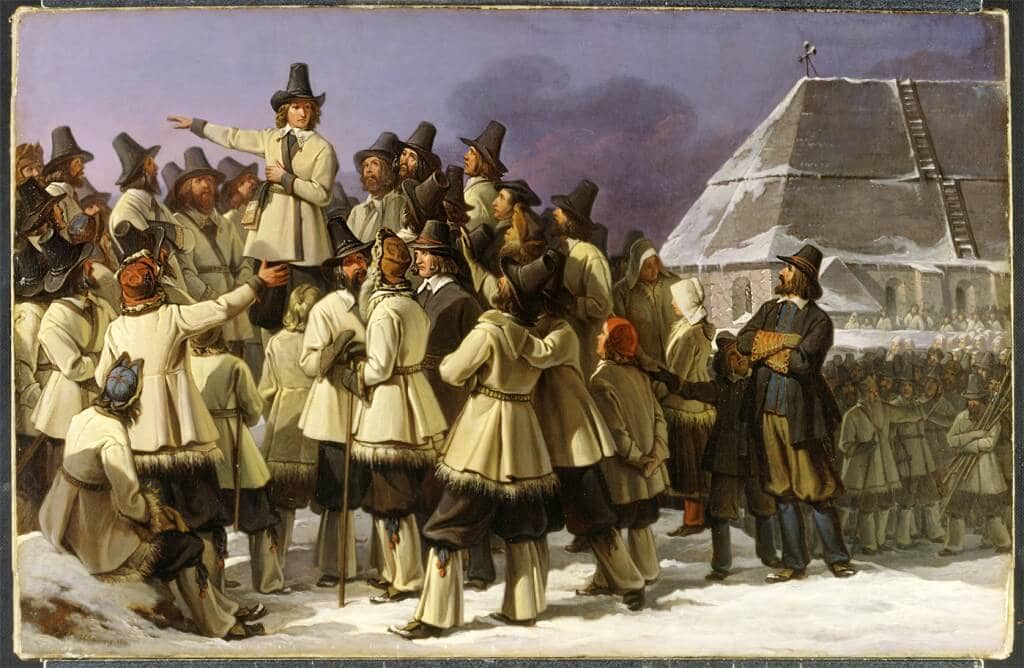
Swedish history comprises more than 10,000 years and starts after the last glacial period when settlers arrived to the northern parts of the country from the east as well as from the south. Agriculture was introduced during the Stone Age. The process of creating political unity started about 1100 A.D. Over time, Sweden was influenced by other cultures such as the Germans during the middle Ages and the French in the 18th century. After winning wars against Denmark-Norway, Russia, and Poland during the 17th century, Sweden emerged as a Great Power. By the treaties of Brömsebro, 1645, and Roskilde, 1658, Sweden acquired important provinces of Denmark and Norway. Russia, Saxony-Poland, and Denmark-Norway pooled their power in 1700 and attacked the Swedish empire. In the subsequent peace treaties, the allied powers, joined by Prussia and by England-Hanover, ended Sweden’s reign as a great power. From 1750 to 1850, agriculture went through a period of modernization, where it shifted gradually from village to private farm-based agriculture during the Industrial Revolution. This led to increased production but also a number of farm laborers without property. Some tried to find jobs in the towns; others left the country, mainly for America. During and after World War I, in which Sweden remained neutral, the country gained from the world-wide demand for Swedish steel, ball bearings, wood pulp, and matches. Post-war prosperity provided the foundations for the social welfare policies characteristic of modern Sweden. In 1994, a further step towards internationalism was taken, when the Swedish people decided in a referendum to join the EU.
Most of the weather is of a cool temperate nature yet the southern section is known to be warmer. The west coast is also warmer than the east due to the warm waters of the Gulf Stream along the west coast. The annual rainfall is moderate due to Norway’s mountains breaking the rain. Summers are fairly low in rain but August can be quite wet. Rainfalls are common in the winter season in the far south of the country. Maximum average temperatures for July are 20°C in the south and about 17°C in the north. Some hot periods do occur in summer with temperatures soaring to over 30 °C. Winters (from October to April) are harsh when temperatures can fall to -50°C. Snow can be several meters deep in the north which gives a great environment for skiing and to about 20cm to 40cm deep in the south. The following are some average temperatures for some of the main cities in Sweden.

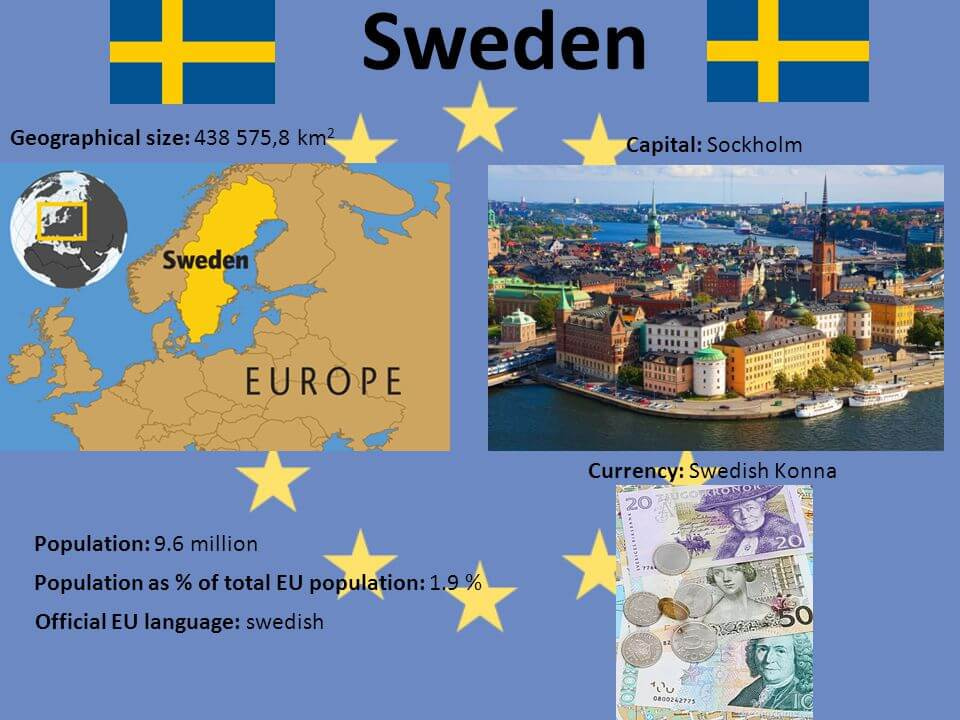
The capital of Sweden, Stockholm, is also the country’s largest city, with more than 930,000 inhabitants. Other large cities are Gothenburg, in western Sweden (population 550,000), and Malmö (population 300,000) in the south. Uppsala and Lund are well-known university cities. The monetary unit in Sweden is the krona (plural “kronor. Sweden has yet to ratify the Euro treaty.
Sweden has among the EU’s lowest levels of national debt, low and stable inflation and a healthy banking system. But this wasn’t always the case. The Swedish economy used to suffer from low growth and high inflation, and the Swedish krona was repeatedly devalued. Sweden was also hit by a deep financial crisis in the early 1990s. Banks became unstable and two were nationalized, unemployment rose rapidly, government spending got out of control, and so did Sweden’s national debt. The road back to stability and success was not easy for Sweden. But by pursuing inventive and courageous reforms and sticking to them, Sweden has transformed its economy and stayed strong in the face of the new global recession.


When you study in Sweden, you’re encouraged to think independently, creatively and critically. You’ll develop your ability to question the status quo by assessing information, seeking new perspectives and coming up with well-informed opinions. You’ll be free to think creatively because of the informal and non-hierarchical nature of Swedish society, where everyone is encouraged to contribute ideas and opinions.
Sweden has a long and proud history of academic excellence and despite its relatively small population, it’s home to some of the world’s best universities. The entire Swedish higher education system is ranked as one of the best in the world, and several Swedish universities are ranked by the Times Higher Education and the Academic Ranking of World Universities as being among the world’s best.


If you’re concerned with sustainable development for a greener future, you’ll feel right at home in Sweden. Environmental issues are high priority here, and Sweden has been named the most sustainable country in the world for its use of renewable energy (it has the highest percentage of renewable energy in the EU). Environmental thinking and sustainability are a part of all aspects of life here, including education. Studying here will give you the chance to draw on Sweden’s deep environmental experience and apply its sustainable approach to your own chosen field.
Swedish society is known for its inclusiveness and equality – you may have heard Sweden referred to as the most equal country in the world. It consistently places among the world’s top countries in gender equality, while lesbian, gay, bisexual and transgender (LGBT) rights in Sweden are regarded as among the most progressive in the world.


I began by reading lots of scholarly articles slowly descending into writing papers, assignments and more and more like research work. Very extensive and packed! Very different from the type of education that I had in India, but quite a pleasant change. Of course, nothing came easy but that’s what the challenge is right?
The semesters are designed in such a manner that balance is maintained between theory and practical. You would have lots of case studies, interaction sessions, research papers to read and presentations to skill. So mostly as a person too you have to be very calm, quick wittedand strong in written as well spoken English and have great soft skills!

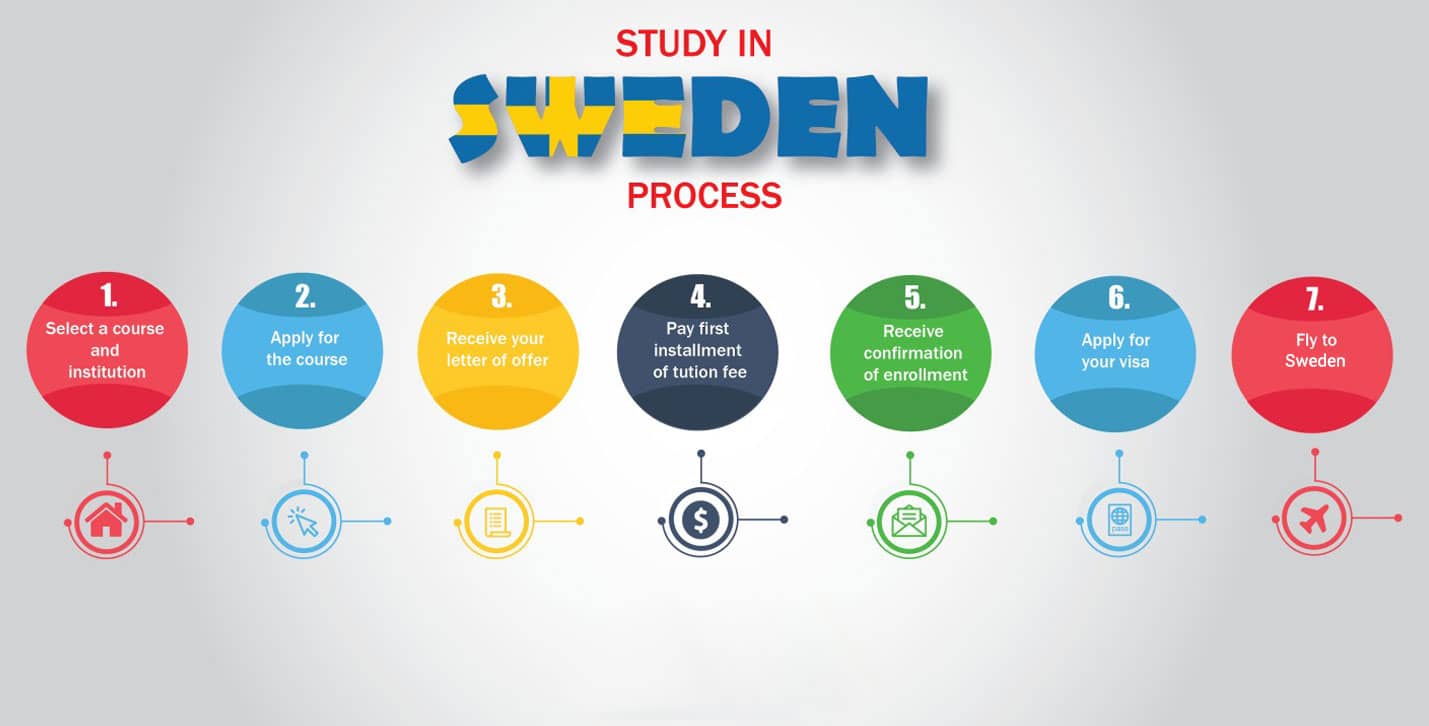
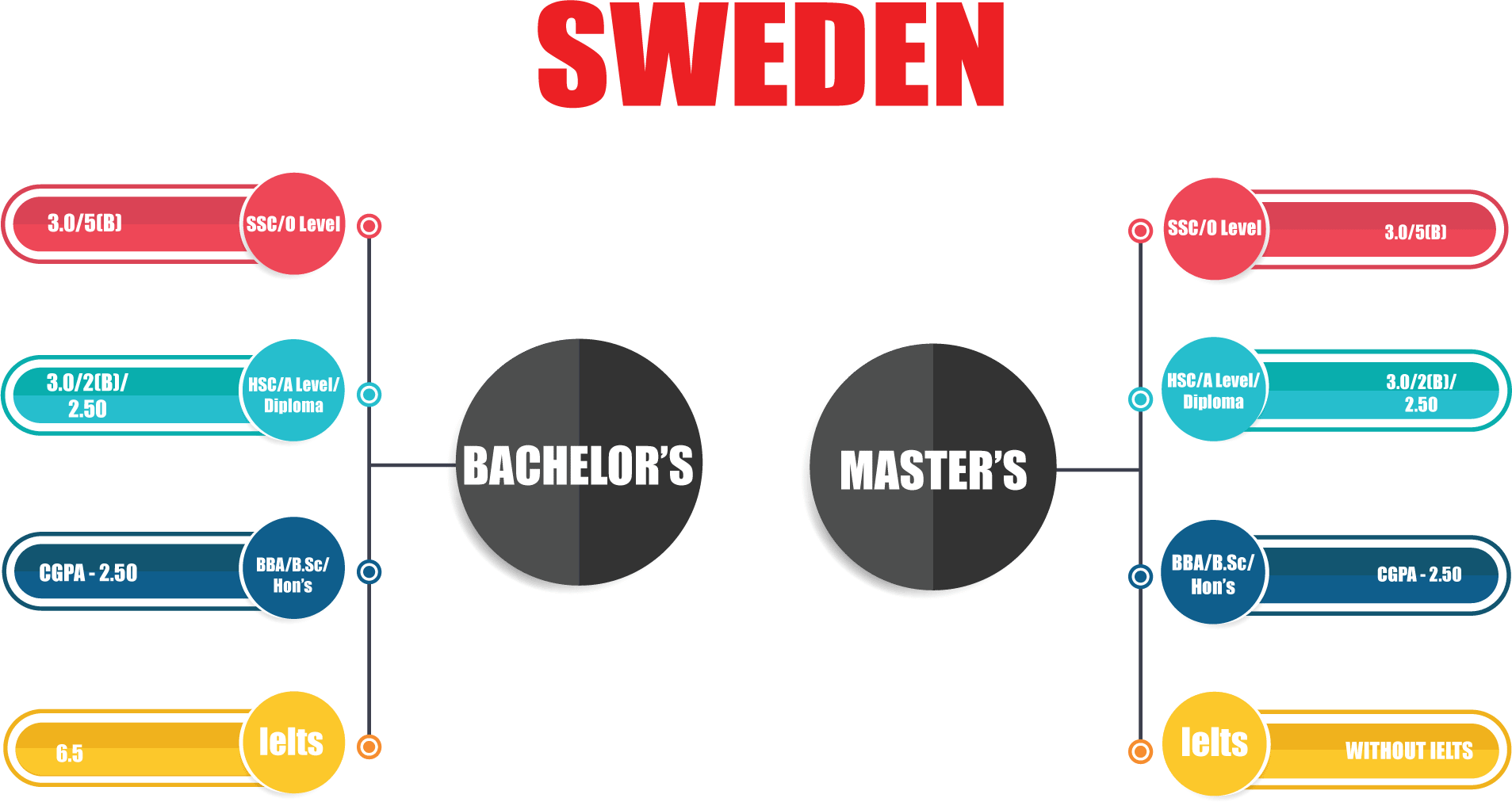

As an international student in Sweden, you’re allowed to work alongside your studies – there’s no official limitation for how many hours you can work. However, it’s important to keep your studies as your first priority – even when you don’t have many classroom hours, you’re expected to spend the equivalent of a 40-hour work week reading and working on assignments.
Most universities have careers services that can help you with finding a part-time job during your studies. Many also offer services like employer fairs, CV checks and special events with companies. Websites like Academic Work and Student Consulting can also be a good place to look for postings.
Sweden is a great place to start your career, and innovative, international companies are found throughout the country. You can apply to extend your residence permit for up to six months to search for a job or start a company, and if you receive a job offer meeting certain conditions you can then apply for a work permit. For more information on requirements and how to apply for an extension or a work permit, visit the Swedish Migration Agency’s website.


|
Postgraduate
|
|
|
Course |
Fee |
| Business | (60,000-180,000) sek |
| EEE | (65,000-155,000) sek |
| CSE | (85,000-126,000) sek |
| Law | (45,000-130,000) sek |
| Life Science | (130,000-200,000) sek |
| Health Science | (100,000-180,000) sek |
| Textile | (130,000-280,000) sek |
| Social Science | (83,000-145,000) sek |
| Arts | (100,000-120,000) sek |
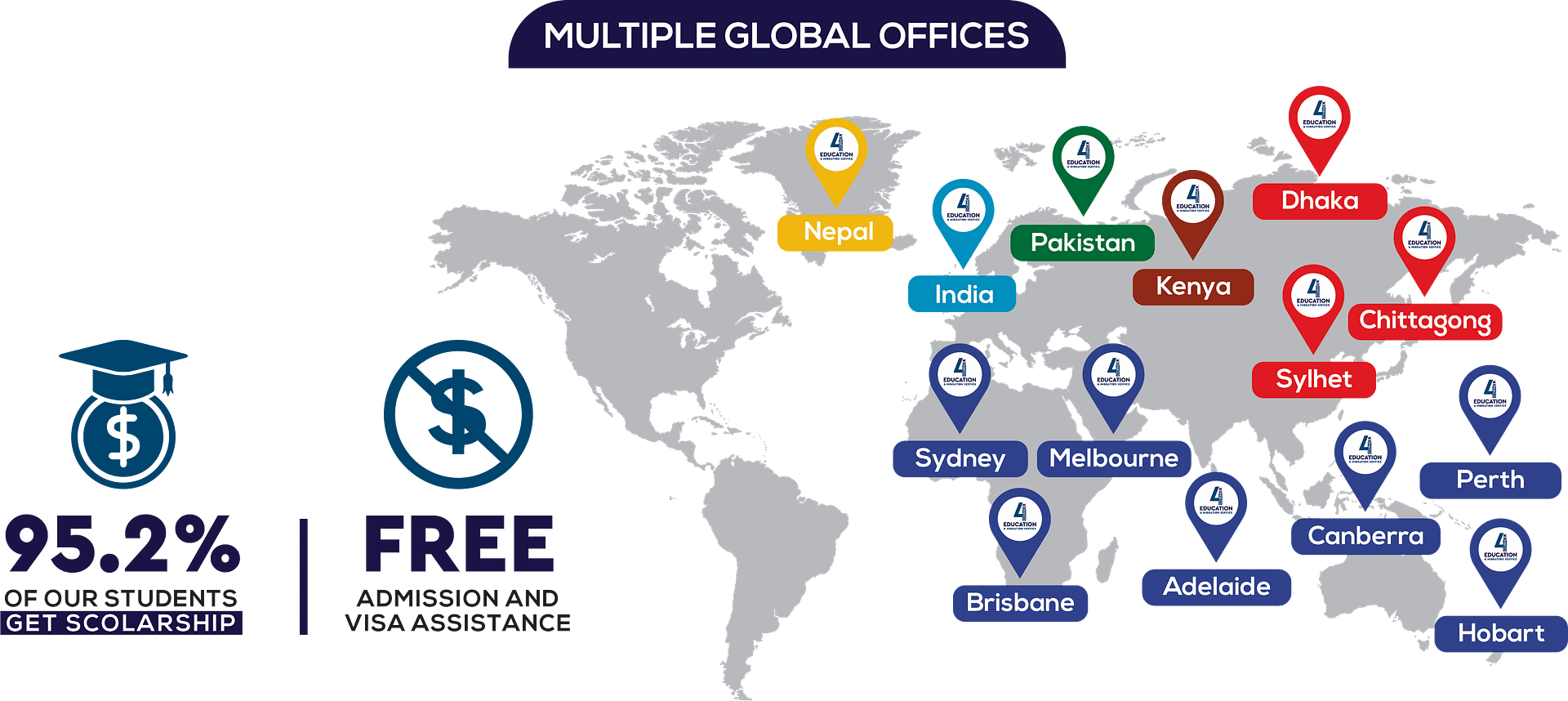

Design & Developed By Pixeltstudio.com